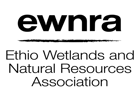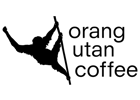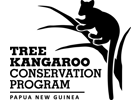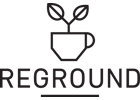Coffee for Wildlife
Make your cup count: support farmers, protect forests, save wildlife.
Enjoy a brew that not only tastes great but makes a positive impact to the planet. Coffee for Wildlife supports projects that empower communities to thrive alongside forests and wildlife.
Coffee for Wildlife is grown under the shade of established trees – a practice known as shade-grown coffee. This method not only enhances the flavour and quality of coffee beans (which is great for coffee lovers!) but also preserves critical habitat (which is great for wildlife!)
Expertly roasted by Genovese Coffee, this sustainably-sourced coffee is available online and at our zoos.
Choose your origin
All Coffee for Wildlife products are 100% Arabica beans and Carbon Neutral, roasted in Melbourne by Genovese, a family-owned roastery committed to quality and sustainability.
Coffee is grown by dedicated projects in Sumatra, Papua New Guinea, and Ethiopia – regions with amazing and unique animal species. Each project supports sustainable livelihoods for farmers and each coffee has a unique flavour, discover them below.
Each coffee variety has a unique flavour profile, discover them all below.
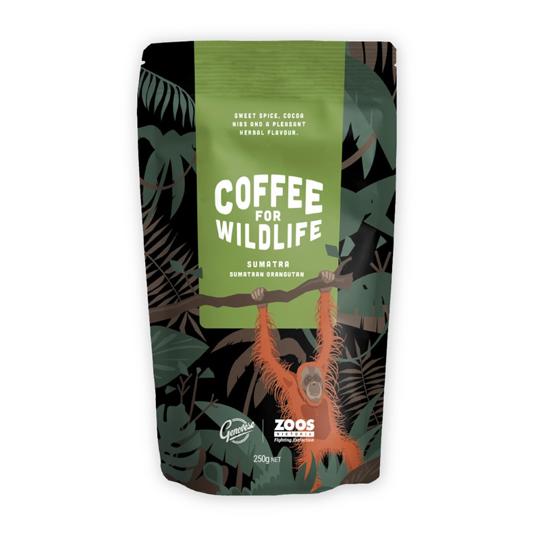
Sumatra 250g | $16.95ea
SWEET SPICE, COCOA NIBS AND A PLEASANT HERBAL FLAVOUR. A ROUND AND JUICY BODY WITH A LINGERING AFTERTASTE.
This coffee is grown by The Orang Utan Coffee Project, on the borders of the Luser ecosystem by over 350 smallholder farmers using sustainable farming methods.
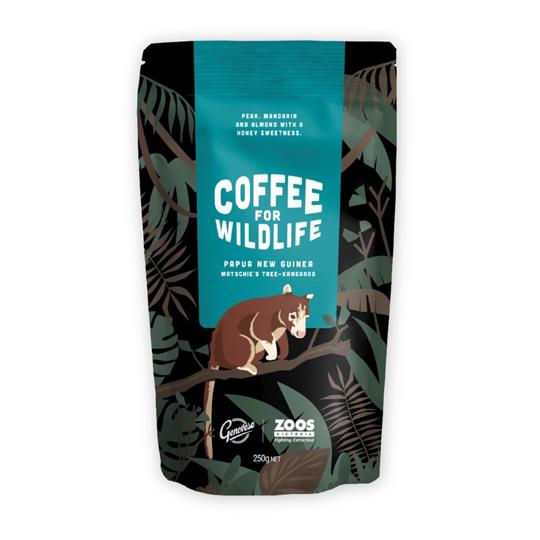
Papua New Guinea 250g | $16.95 ea
PEAR, MANDARIN, LEMONGRASS AND ALMOND WITH A HONEY SWEETNESS.
Sourced through the Tree Kangaroo Conservation Program (TKCP) and grown in the cloud forest of the YUS Conservation Area by more than 1,000 families.
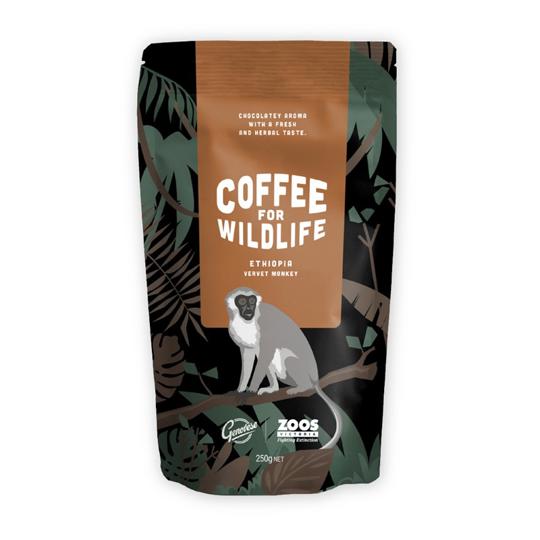
Ethiopia 250g | $16.95 ea
COMPLEX FLORAL FLAVOURS OF JASMINE, BERGAMOT AND BLUEBERRY. A UNIQUE AND LIGHT BODY WITH MILD ACIDITY.
Coffee grown wild and picked with minimal intervention in the Bench-Sheko Zone, the Community Conservation of Wild Coffee and Natural Forest Management Project supports both sustainable livelihoods for local communities and conservation efforts in the region.
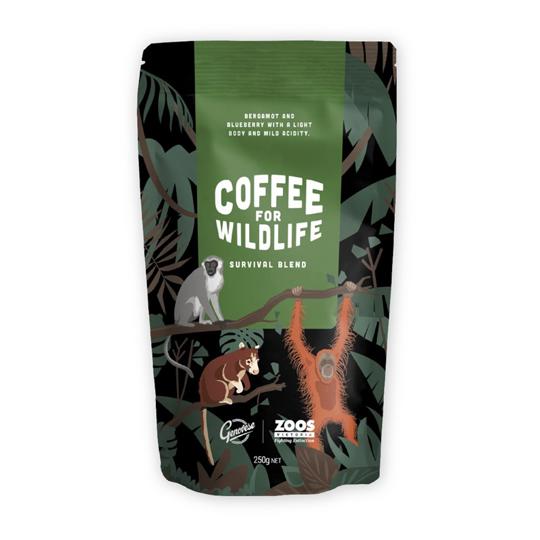
Survival Blend 250g | $16.95 ea
bergamot and blueberry with a light body and mild acidity. EASY-DRINKING AND WELL-BALANCED BLEND OF SINGLE ORIGIN ARABICA BEANS.
This unique blend contains coffee beans from each of the origins, supporting local growers and providing habitat protection for wildlife from all projects.
The Survival Blend is served at our zoo cafes, try it on your next zoo visit.
Your coffee can still have a real impact
Thank you!
Since the launch of Coffee for Wildlife in 2022, we've purchased more than 11,000 kgs of shade-grown beans from our international conservation partners, providing a sustainable income to farmers and protecting habitat from deforestation.
Thanks to you, Coffee for Wildlife is helping people, forests and wildlife in Papua New Guinea, Sumatra and Ethiopia.
Papua New Guinea
Grown in the cloud forests of the YUS Conservation Area (Yopno-Uruwa-Som) on the Huon Peninsula, this coffee comes from a region rich in biodiversity and essential habitat for many native species, including the endangered Matchie’s Tree Kangaroo.
Through the Tree Kangaroo Conservation Program, approximately 1,000 families sustainably cultivate these beans, each pledging to protect some of their land as habitat for wildlife.
Thanks to Coffee for Wildlife, funds have supported the installation and maintenance of multiple trail cameras to monitor wildlife activity within the coffee plantations. As of 2025, 1108 animals were recorded, including the Raffray’s Bandicoot and the New Guinea Hary Eagle – both species are highly sensitive to habitat disturbance. Their presence is a strong indicator of how low the impact farming practices employed benefits both wildlife and habitat whilst still supporting the demand for coffee.
Sumatra
The Sumatran beans are sourced from the Orang Utan Coffee Project, who work with 350 smallholder farmers in seven villages located in the Gayo Highlands in Aceh.
Each of these villages borders on the internationally significant Leuser Ecosystem, an approximately 1-million-hectare area that is the last place on Earth where rhinos, tigers, elephants and orangutans all still roam. The Orang Utan Coffee Project aims to protect wildlife by preserving the remaining rainforest habitat of the Leuser Ecosystem.
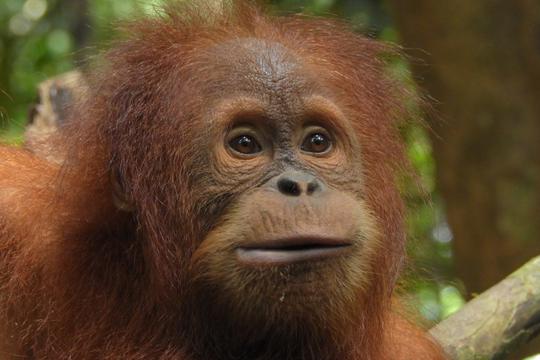
To safeguard this habitat, the Orang Utan Coffee Project invests in training and infrastructure to support farmers as well as paying them a premium for commit to strict organic and environment standards.
Growing shade-grown coffee in these locations also helps maintain the buffer zone between the Leuser Ecosystem and local communities, protecting the forests from deforestation and human encroachment.
A portion of funds through green bean sales are also directed to the Sumatran Orangutan Conservation program.
Thanks to Coffee for Wildlife, organic standards have increased and wildlife monitoring has shown several bird species are breeding within coffee farms. This highlights how well-managed, shade-grown coffee farms support both good quality coffee beans and a rich biodiversity!
A portion (50 Euro cents per kg of green beans) of exports is also directed to support the work of the Sumatran Orangutan Conservation Program.
Ethiopia
The Ethiopian beans grow wild and through minimal intervention beneath tree canopy in Afromontane forest in an area called the Bench-Sheko zone, supporting sustainable livelihoods through the Community Conservation of Wild Coffee and Natural Forest Management Project.
The coffee is sourced via a long-standing initiative – the Community Conservation of Wild Coffee and Natural Forest Management Project – that supports the community-based conversation of wild and minimal-intervention coffee.
The partners on this project are the Ethio Wetlands and Natural Resources Association and the University of Huddersfield.
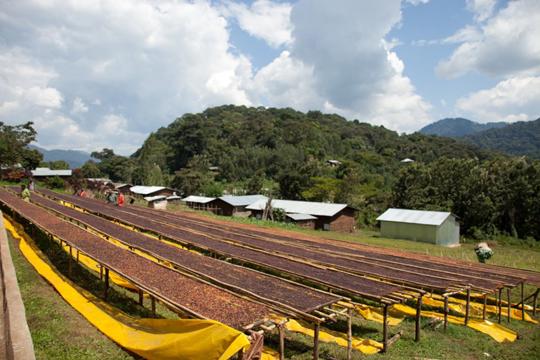
One of the central aims of the project is to empower local communities to manage forest resources profitably and develop sustainable uses for non-timber forest products like coffee, Ethiopian cardamom, and honey, to increase household income. The main beneficiaries of the coffee growing are 79 local communities with forest management groups.
The project works directly with over 6,000 families who are involved in the forest management groups and at least 30% of the core positions of the forest management groups and co-ops are occupied by women.
Did you know our coffee bags are compostable?
Simply place the finished bags in home compost. If you don’t have a home compost, you can put the bag in your general waste bin (NOT recycling) as it will degrade like organic matter.
Alternatively, we have a special coffee bag compost bin in our retail shops. Once we receive them, they will be processed in Melbourne Zoo’s ‘hot rot’ industrial composting system and turned into high quality compost for our gardens.
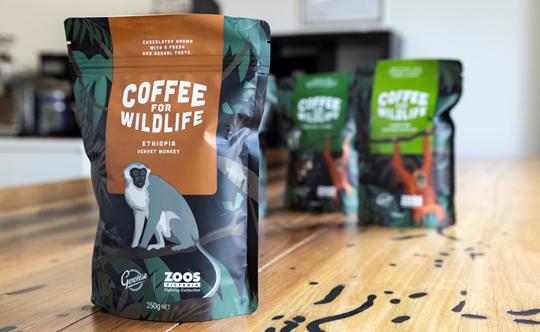
Is the packaging sustainable? Will my beans stay fresh? How do I best dispose of the coffee grounds?




